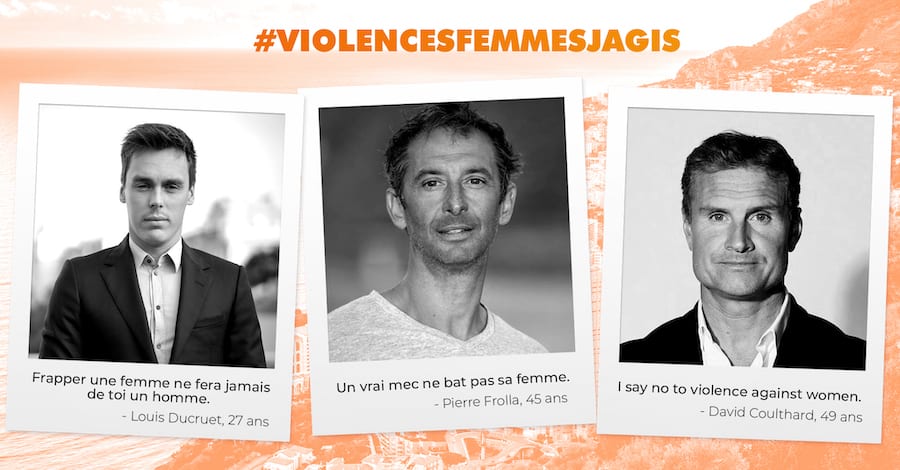As part of the International Day to End Violence against Women on 25th November, a Monegasque campaign has turned the spotlight onto men – the silent allies of victims of domestic violence.
Princess Stéphanie’s son Louis Ducruet, ex-Formula One racer David Coulthard and Champion Diver Pierre Frolla are among 100 men who have united for the campaign, created by SheCanHeCan and Fight Aids Monaco, and supported by the Committee for the Promotion and Protection of Women’s Rights in Monaco.
“Domestic violence is often seen as a woman’s problem,” Vibeke Brask Thomsen, Director of SheCanHeCan, told Monaco Life, “Like when we say ‘gender’, we think of women, or when we say ‘race’, we think of people of colour, or when we say ‘sexual orientation’, we think of homosexuals – as if men don’t have a gender, white people don’t have a race, or heterosexuals don’t have a sexual orientation. This approach allows the majority group, in this case men, not to pay attention, as long as domestic violence is seen as a women’s problem.”
The campaign launched on Monday 23rd November and features portraits of 100 men, each with a message he chose to share, such as “Hitting a woman will never make you a man” or “I say no to violence against women”. The images are visible on the websites and social media networks of SheCanHeCan, Fight Aids Monaco and the Committee for the Promotion and Protection of Women’s Rights.
Participants were also invited to take a pledge for equality promising to continue their actions to make equality a reality in their daily lives.
“We must remember that the majority of men do not perpetrate violence against women, they don’t find it ok, and they don’t support it,” said Ms Brask Thomsen to Monaco Life. “We call them the silent majority because we don’t hear from them enough. The aim of this campaign is to shine light on the majority of men who are against violence and whom we seldom hear. Our aim is to portray them as allies.”
According to a statement by Josep Borrell, Vice President of the European Commission, “The scale of the problem remains alarming: one in three women in the European Union have experienced physical and/or sexual violence.”
These numbers are only the tip of the iceberg, as this type of violence remains largely unreported due to the stigma and shame surrounding it. As a result, many perpetrators go unpunished.
And for many, the Covid-19 pandemic and subsequent lockdowns have only made the situation worse.
“Domestic violence is seen as something to be dealt with in the private sphere, that we shouldn’t interfere with,” said Ms Brask Thomsen. “But the entire community has a role to play in challenging a culture which allows such violence to take place. In the end, it’s the small actions which can really make a difference: don’t laugh at that joke, don’t catcall women on the street, don’t sexualise young girls or focus on their appearance instead of their achievements, don’t use vocabulary such as ‘don’t cry like a girl’ or ‘you run like a girl’ in negative terms. Be a positive role model for younger boys, allow them to show their emotions, to teach them it’s ok to cry and be the good guy.”
To mark International Day to End Violence against Women on 25th November, the Prince’s Palace, the Conseil National and the Tour Odeon will all be lit in orange to show support for victims of domestic violence worldwide.
A conference on the theme ‘The justice system confronted to intrafamilial violence’ hosted by Robert Gelli, State Secretary for Justice, will take place on 26th November at 6pm at the Lycée Technique et Hotelier in Monaco.
To register for the conference, email: dfm@gouv.mc.
Men unite for anti-violence against women day
